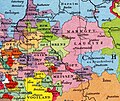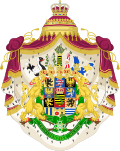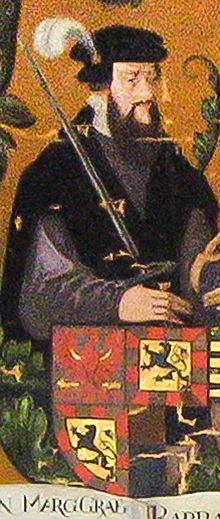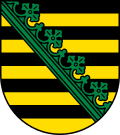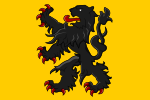The Duchy of Saxe-Wittenberg (German: Herzogtum Sachsen-Wittenberg) was a medieval duchy of the Holy Roman Empire centered at Wittenberg, which emerged...
13 KB (1,377 words) - 12:02, 30 June 2024
List of rulers of Saxony (redirect from Dukes of Saxe-Wittenberg)
decided to merge Saxe-Lauenburg into Prussia, as district Duchy of Lauenburg, with effect from 1 July 1876. The Ascanian line of Saxe-Wittenberg became extinct...
101 KB (987 words) - 07:29, 5 August 2024
Albert of Saxe-Wittenberg may refer to: Albert II, Duke of Saxe-Wittenberg (1250–1298), first duke of Saxe-Wittenberg after its definite division from...
624 bytes (124 words) - 23:58, 12 February 2019
museum dedicated to Luther. Wittenberg was also the seat of the Elector of Saxony, a dignity held by the dukes of Saxe-Wittenberg, making it one of the most...
43 KB (4,562 words) - 19:20, 25 August 2024
the Golden Bull of 1356, Emperor Charles IV designated the Duchy of Saxe-Wittenberg an electorate, a territory whose ruler was one of the prince-electors...
55 KB (6,732 words) - 00:07, 30 August 2024
Duchy of Saxony. Later, the remaining state was split into Saxe-Lauenburg and Saxe-Wittenberg. The Ascanian dynasties in the two Saxon states became extinct...
159 KB (2,006 words) - 20:13, 30 May 2024
remaining lands were divided between the Ascanian dukes of Saxe-Lauenburg and Saxe-Wittenberg, the latter obtaining the title of Electors of Saxony by the...
29 KB (3,115 words) - 22:28, 31 August 2024
1284 – 12 March 1356), a member of the House of Ascania, was Duke of Saxe-Wittenberg from 1298 until his death. By the Golden Bull of 1356 he was acknowledged...
16 KB (2,013 words) - 23:51, 25 April 2024
Duchy of Saxony, as it is called in distinction from the Duchy of Saxe-Wittenberg, became the centre of the opposition of the German princes to the imperial...
28 KB (3,873 words) - 03:43, 4 September 2024
John, Margrave of Brandenburg-Kulmbach (redirect from Barbara of Saxe-Wittenberg)
Barbara of Saxe-Wittenberg (1405–1465), daughter of Rudolf III, Duke of Saxe-Wittenberg, John hoped to eventually succeed to Saxe-Wittenberg once its line...
7 KB (500 words) - 12:31, 2 May 2024
1370, he lost Celle to the Ascanian dukes of Saxe-Wittenberg (Albert and his uncle Wenceslas, Elector of Saxe-Wittemberg), who had been given the principality...
6 KB (461 words) - 13:00, 30 March 2024
by 1296 definitely partitioned Saxony, providing Saxe-Lauenburg for the brothers, and Saxe-Wittenberg for their uncle Albert II. The last document mentioning...
49 KB (5,512 words) - 14:28, 31 August 2024
Wenceslas I, Duke of Saxe-Wittenberg (c. 1337 – 15 May 1388, in Celle) from the House of Ascania ruled from 1370 to 1388 and was a prince-elector of the...
6 KB (394 words) - 17:44, 14 February 2023
Ascania, was Duke of Saxe-Wittenberg and Elector of Saxony from 1388 until his death. He was probably born at the Saxon Wittenberg residence, the eldest...
5 KB (315 words) - 03:53, 12 November 2023
divided Saxony into the duchies of Saxe-Lauenburg and Saxe-Wittenberg with definite effect of 1296. Saxe-Wittenberg was recognized as the electorate of...
24 KB (2,916 words) - 06:24, 22 July 2024
III.; c. 1375/1380 – before 12 November 1422) was the last Duke of Saxe-Wittenberg and Elector of Saxony from the House of Ascania. After his death, King...
6 KB (412 words) - 03:52, 12 November 2023
List of Saxon royal consorts (redirect from Duchess consorts of Saxe-Weissenfels)
definitely split their commonly ruled Duchy of Saxony into Saxe-Lauenburg and Saxe-Wittenberg, either in 1269, 1272 or 1282, one can argue, that Agnes was...
118 KB (245 words) - 21:22, 31 August 2024
over the Saxon electoral dignity between the Ascanian duchies of Saxe-Wittenberg and Saxe-Lauenburg. Henry of Carinthia voting for Frederick actually only...
13 KB (1,301 words) - 14:44, 30 August 2024
1315, was to Anna of Saxe-Wittenberg (died between 25 June 1327 and 9 August 1328), the daughter of Duke Albert II of Saxe-Wittenberg and Agnes Habsburg...
8 KB (909 words) - 12:04, 22 March 2024
(1596–1638; 1640–1644; 1662–1809)/ Saxe-Coburg-Eisenach (1572-1596; 1633-1638)/ Saxe-Weimar (1572–1809)/ Saxe-Wittenberg (1296–1356) with the black-yellow...
16 KB (1,373 words) - 13:04, 5 July 2024
was erected at the new residence of the Ascanian duke Rudolf I of Saxe-Wittenberg in about 1340. Consecrated on 6 May 1346, Rudolf subordinated his foundation...
18 KB (1,531 words) - 06:41, 3 June 2024
Wettin dynasty, the margravate finally merged with the former Duchy of Saxe-Wittenberg into the Saxon Electorate by 1423. In the mid 9th century, the area...
14 KB (1,399 words) - 06:03, 10 July 2024
Lion in 1180, the medieval Duchy of Saxony dissolved and the Duchy of Saxe-Wittenberg lands passed to the House of Ascania and later to the Wettins in the...
2 KB (271 words) - 03:57, 15 February 2024
Rudolf II, Duke of Saxe-Wittenberg, nicknamed Rudolf the Blind, (c. 1307 – 6 December 1370 in Wittenberg) was a member of the House of Ascania. He was...
10 KB (1,029 words) - 23:55, 25 April 2024
the neighbouring principalities of Brunswick-Lüneburg, Mecklenburg, Saxe-Wittenberg, Pomerania-Wolgast, Jawor and Żagań, for control of different parts...
35 KB (3,951 words) - 18:11, 20 August 2024
Anna of Saxe-Wittenberg (died: 18 April 1426) was a member of the House of Ascania and the wife of Duke Frederick I of Brunswick-Lüneburg, a German anti-king...
3 KB (176 words) - 04:53, 6 July 2024
Saxe-Lauenburg and Saxe-Wittenberg. Both claimed the Saxon electoral privilege for themselves, but the Golden Bull of 1356 accepted only Wittenberg's...
74 KB (6,816 words) - 15:20, 2 September 2024
Albert of Saxe-Wittenberg and his uncle, Wenceslas with the Principality, thereby triggering the war. The town of Lüneburg supported the Wittenbergs, taking...
16 KB (2,158 words) - 04:11, 28 August 2020
Albert II, Duke of Saxony (category Dukes of Saxe-Wittenberg)
II received Saxe-Wittenberg around the eponymous city and Belzig. Albert II thus became the founder of the Ascanian line of Saxe-Wittenberg. In 1282 Albert...
6 KB (651 words) - 16:56, 7 September 2024
Albert of Saxe-Wittenberg (German: Albrecht von Sachsen-Wittenberg; died 28 June 1385 in Wittenberg) was born as the son of Otto (d. 30 March 1350), a...
6 KB (517 words) - 17:43, 22 February 2021

